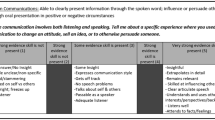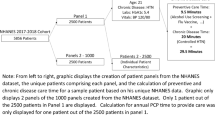Abstract
Background The Indian Health Service Anticoagulation Training Program serves to improve patient safety through advanced anticoagulation management training. Although post-program evaluations of program content were conducted at the time of program delivery, little is known about translation of these learned skills into clinical practice. Objective This research sought to describe levels of self-reported participant confidence in anticoagulation management; development, implementation, and performance management of both core and supplemental activities of anticoagulation clinics or services; and current anticoagulation clinical practices subsequent to participating in the Anticoagulation Training Program. Setting A federal Indian Health Service healthcare facility in Oklahoma, USA. Methods A cross-sectional, electronic mail survey was designed, pretested, and administered to 267 eligible Anticoagulation Training Program participants from 1999 to 2009. Data were analyzed using descriptive statistics and interpreted to identify areas of strength and opportunities for improvement. Main outcome measures Information about confidence in anticoagulation management skills; development, implementation and improvement of both core and supplemental activities of anticoagulation clinics or services; and current anticoagulation clinical practices was collected. Results After training, over 90 % of participants reported agreement/strong agreement with statements about confidence in performing patient-care related anticoagulation activities. A smaller proportion (83.3–85.4 %) reported agreement/strong agreement with confidence in measuring, analyzing and reporting anticoagulation outcomes. Improvement activities were more common than development or implementation activities (65.4, 31.9 and 35.1 %, respectively). Not having well established reimbursement procedures, lack of dedicated clinic space, and lack of dedicated personnel salaries (47.3, 38.3 and 32.6 %, respectively) were reported as the most common barriers to developing, implementing or improving an anticoagulation clinic. Participants indicated that anticoagulation outcomes tracking was the most common supplemental development, implementation and improvement activity (37.9, 37.0 and 43.8 % respectively). Benchmarking was the least commonly reported outcomes-related activity by participants (33.6 %). Although there was only a modest gain in the number of established anticoagulation clinics after attending the Anticoagulation Training Program, approximately 21 % of participants reported using skills learned to establish other disease state management clinics. Conclusion In general, a majority of participants reported high levels of confidence related to direct patient care activities after attending the Anticoagulation Training Program. However there is a need to raise confidence in performance improvement and outcomes management activities to align with current accreditation standards in anticoagulation management as the Anticoagulation Training Program evolves.
Similar content being viewed by others
References
Bartholow M. Top 200 drugs of 2010. Pharmacy times web site. 2011. Retrieved from http://www.pharmacytimes.com/publications/issue/2011/May2011/top-200-Drugs-of-2010. Accessed 19 July 2013.
Ansell J, Hirsh J, Hylek E, Jacobson A, Crowther M, Palareti G. Pharmacology and management of the vitamin K antagonists: American College of Chest Physicians Evidence-Based Clinical Practice Guidelines (8th edition). Chest. 2008;133(6 Suppl):160S–98S.
Holbrook AM, Pereira JA, Labiris R, McDonald H, Douketis JD, Crowther M, et al. Systematic overview of warfarin and its drug and food interactions. Arch Intern Med. 2005;165:1095–106.
Hsiao C, Cherry DK, Beatty PC, Rechsteiner EA. National ambulatory medical care survey: 2007 summary. 2010. National Health Statistics Reports, number 27. Retrieved from http://www.cdc.gov/nchs/data/nhsr/nhsr027.pdf.
Classen DC, Jaser L, Budnitz DS. Adverse drug events among hospitalized Medicare patients: epidemiology and national estimates from a new approach to surveillance. Jt Comm J Qual Patient Saf. 2010;36(1):12–21.
Hayes BD, Klein-Schwartz W, Gonzales LF. Causes of therapeutic errors in older adults: evaluation of National Poison Center data. J Am Geri Soc. 2009;57:653–8.
Barker KN, Flynn EA, Pepper GA. Medication errors observed in 36 health care facilities. Arch Intern Med. 2002;162:1897–903.
The Joint Commission. Accreditation programs: hospitals. 2013 national patient safety goals. Retrieved from http://www.jointcommission.org/assets/1/18/NPSG_Chapter_Jan2013_HAP.pdf.
Rathbun S. The surgeon general’s call to action to prevent deep vein thrombosis and pulmonary embolism. Circulation. 2009;119:e480–2.
Dillman DA. Mail and telephone surveys: the total design method. New York: Wiley; 1978.
Aday L. Designing and conducting health surveys. 2nd ed. San Francisco: Jossey-Bass; 1996. p. 535.
Finley C, Finley R. SurveyMonkey.com, LLC. Palo Alto, California; 1999.
Ackermann AD, Kenny G, Walker C. Simulator programs for new nurses’ orientation: a retention strategy. J Nurses Staff Dev. 2007;23(3):136–9.
Coates V, Andrews J, Davies M, Hart P, Martin S, McUrlean U, et al. An evaluation of multi-professional education in diabetes. J Interprof Care. 2008;22(3):295–307.
Bandura A. Self-efficacy: toward a unifying theory of behavioral change. Psychol Rev. 1977;84:191–215.
Bandura A. Social foundations of thought and action: a social cognitive theory, Prentice-Hall, Inc., Englewood Cliffs NJ; 1996:390–409.
Bandura A. Self-efficacy mechanism in human agency. Am Psychol. 1982;37:122–47.
Bandura A. Self-efficacy: the exercise of control. New York: Freeman Company; 1997.
Babenko-Mould Y, Andrusyszyn M, Goldenberg D. Effects of computer-based clinical conferencing on nursing students’ self-efficacy. J Nurs Educ. 2004;43:149–55.
Lent WR, Schmidt J, Schmidt L. Collective efficacy beliefs in student work teams: relation to self-efficacy, cohesion, and performance. J Vocat Behav. 2006;68:73–84.
Acknowledgments
The authors wish to express their appreciation to the George F. Archambault Foundation for their education support of the ATP and to Travis Watts and Richard Bertin for their extensive contributions to the ATP.
Funding
The Indian Health Service Anticoagulation Training Program received unrestricted educational funding from the George F. Archambault Foundation for this program.
Conflicts of interest
Ryan Schupbach serves as the Program Director of the Indian Health Service Anticoagulation Training Program. Nicholas Sparrow, Michael Miller and Donald Harrison have no conflicts of interest.
Author information
Authors and Affiliations
Corresponding author
Additional information
The opinions expressed in this paper are those of the authors and do not necessarily reflect the views of the Cherokee Nation or the Indian Health Service.
Rights and permissions
About this article
Cite this article
Schupbach, R.R., Sparrow, N.D., Miller, M.J. et al. Participant perspectives from the Indian Health Service Anticoagulation Training Program. Int J Clin Pharm 35, 1091–1098 (2013). https://doi.org/10.1007/s11096-013-9826-4
Received:
Accepted:
Published:
Issue Date:
DOI: https://doi.org/10.1007/s11096-013-9826-4




